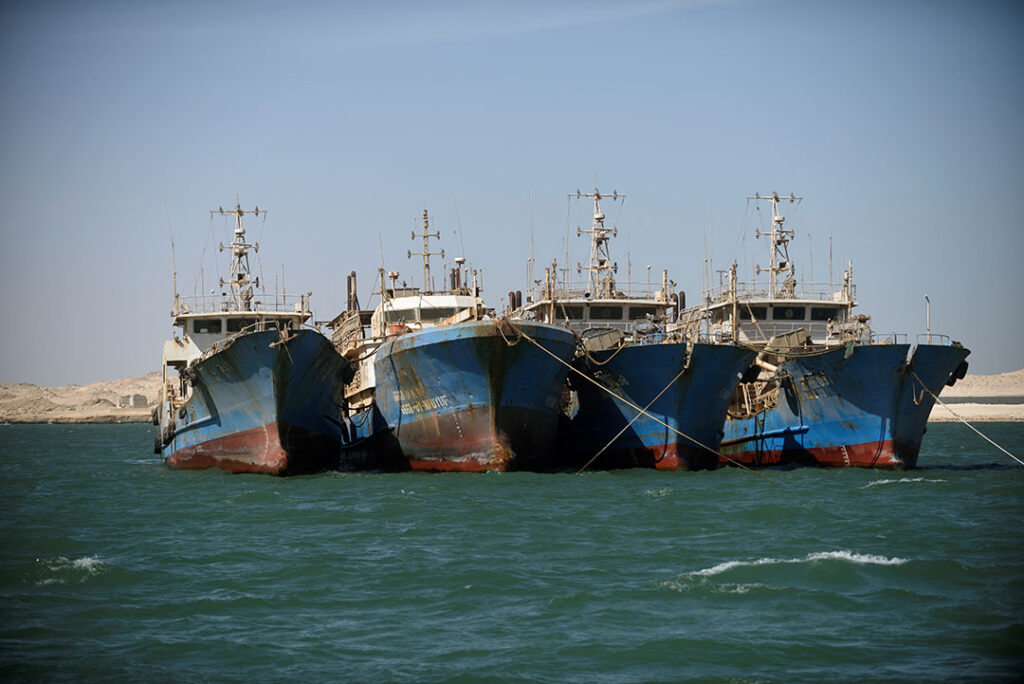ADF STAFF
A young man in a yellow T-shirt strained as he helped pull a fishing net from the Gulf of Guinea. A resident of Sierra Leone, Abu Bakr Aconteh frowned as he surveyed the haul.
“We are not happy with this, because it is a small catch,” he told the BBC.
Like many fishermen in West Africa, Aconteh blames dwindling fish populations on foreign trawlers, all of which are much larger, more sophisticated vessels than the wooden canoe used by his crew. Roughly three-quarters of the foreign industrial trawlers in Sierra Leone are Chinese.
Although much of the locally caught fish is exported to China and Europe, Sierra Leone collects less than 10% of the money made by foreign fishers, the BBC reported. In Liberia and Guinea, the profits are even less.
“We’d like the government to take these people away — to stop fishing in this country,” Aconteh said.
Although Sierra Leone imposed a one-month fishing moratorium in 2019 to replenish fish stocks, its government also licenses industrial Chinese trawlers to fish its waters. The government collects permit fees, but the trawlers decimate fish populations and damage the ecosystem. The lack of fish takes money and food from local households.
It is a familiar scenario throughout West Africa, where roughly 7 million people depend on fishing for income, and up to 50 million are at risk of food insecurity and malnutrition.
Around the region, Chinese trawlers are known to engage in illegal, unreported and unregulated (IUU) fishing, often fishing in waters reserved for local artisanal fishermen, keeping fraudulent records, transmitting fake locations, and identifying data and bribing or threatening workers at local fisheries.
It is estimated that IUU fishing and other illegal marine trade could cost West African countries “nearly $1.95 billion across the fish value chain and $593 million per year in lost household income,” according to a recent story in The Africa Report.
Through loans and licenses, China appears intent on expanding its maritime commercial presence in West Africa. Ghana recently secured a $60 million Chinese grant to build a new fishing harbor in Jamestown. Mauritania signed an $87 million Chinese loan to build a new port near Nouakchott, and Sierra Leone accepted a $708 million Chinese loan to develop a huge port expansion in Freetown.
“The Chinese diplomatic service, which has one of the largest embassy networks of any global power, is very proactive in researching the openings for Chinese fishing firms in Africa,” Mark Godfrey, who covers China’s distant fishing fleet for Seafood Source, told ADF in an email.
“Diplomats regularly meet fishery ministers in the host state and are sometimes accompanied by executives from fishery companies who seek a license to operate. These kinds of introductions are not unusual in the world of commerce and trade, but what is different is the opaque nature of the deals made.”
The proliferation of China-owned fishmeal factories in Mauritania, Senegal and The Gambia compounds the fears of West Africans who depend on fishing for their livelihoods. Besides emitting pollution that destroys ecosystems and chokes local residents, the factories — mostly fed by large industrial trawlers — produce a product made from fish populations in rapid decline.
Most of West Africa’s fishmeal is shipped to China, the world’s largest fishmeal importer.
That leaves local fishermen with empty nets, wallets and stomachs — and a grim outlook on the future.
“People are thinking there are no more fish left,” Gaoussou Gueye, a veteran Senegalese fisherman, told Deutsche Welle.

